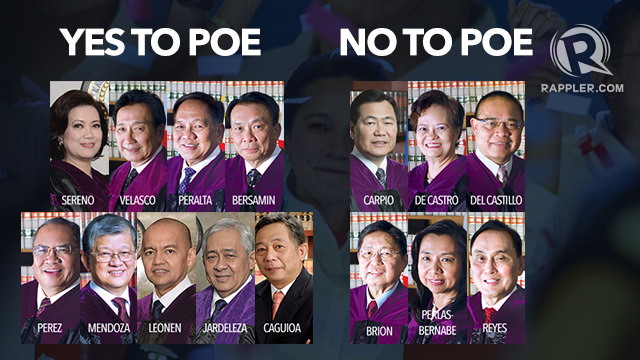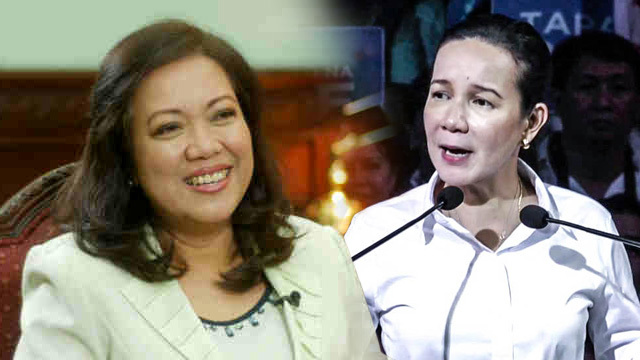I read the Supreme Court’s decision in the Poe vs. Comelec case allowing Senator Grace Poe, whose parents are unknown, to run for the presidency because she is most likely “a natural born citizen” -- a constitutional requirement for the highest office of the land.
The Supreme Court majority opinion spent great lengths in justifying its position using procedural law, circumstantial evidence, and selected statements of the framers of the 1935 Constitution. The Supreme Court also considered a person’s biological appearance as evidence of being a Filipino. It observed that Senator Grace Poe “has typical Filipino features: height, flat nasal bridge, straight black hair, almond shaped eyes, and oval face.”
The Supreme Court also relied on the “disputable presumption that things happened according to the ordinary course of nature and the ordinary habits of life.” And because at the time Senator Grace Poe was born in Iloilo, ninety-nine percent (99%) of the babies there were reported to be Filipinos, “this would indicate more than ample probability if not statistical certainty that petitioner’s parents are Filipinos.” The Supreme Court likewise said that “the private respondent’s should have shown that both of the petitioner’s parents were alien and that “her admission that she is a foundling did not shift the burden to her because such status did not exclude the possibility that her parents were Filipinos”.
And regarding foundlings, the Supreme Court said that “while the 1935 Constitution’s enumeration is silent on foundlings, there is no restrictive language which would definitely exclude foundlings either.” It referred to international law which, according to the Supreme Court, should not be applied strictly “if we are to be considered civilized and a member of the community of nations.” Finally, the Supreme Court concluded that “the whole process by the Comelec is wrapped in grave abuse of discretion.”
The decision is disturbing. I do not believe that Comelec committed grave abuse of discretion. Nonetheless, we must follow the decision and move on to the election on May 9, 2016. But we should not stop criticizing the Supreme Court decision if we think it is wrong.
First, why is the decision disturbing?
The Grace-Poe-disqualification-case is of transcendental importance. It involves no less than the qualification of the next President of the Philippines -- the highest and most powerful officer of the land -- the person who will be the government’s top domestic public administrator, premiere foreign policy and legislative formulator, economic czar, security guarantor, commander-in chief, and foremost political leader whose decisions will affect no less than 100,000,000 Filipinos here and abroad.
The president’s burden is heavy, the responsibilities great, the delegated power awesome, and the privileges incomparable. And these are the reasons why the issue on presidential qualification demands an exacting resolution based on solid grounds -- not on possibilities, more-than-ample-probabilities, disputable presumptions, statistical certainty, extraneous international law and, yes, even biological physical features of the candidates.
Only the certitude of being a natural-born can provide a legal and objective standard to the questions of genuine attachment to the country and dedication to the affairs of the nation. This is not to say that naturalized-Filipinos are “less Filipinos” than natural-born, but common wisdom dictates that as between a natural born and naturalized Filipino, or for that matter, a Filipino whose natural born citizenship is certain and one whose citizenship is in doubt because of unknown parents of uncertain citizenship, or also, for that matter, a pure Filipino and a “returning” one who once abjured his/her allegiance to the country, the Filipino people will be more at ease and assured with the former as a leader when it comes to issues of loyalty to the national interest. And that level of national comfort is vital to the country. To others, this may or may not be true, but what and how else can we set a minimum requirement to at least provide an initial assurance that the candidate will exhibit his fullest fealty to the nation.
As James Madison said: “birth is a criterion of allegiance.” And if the fundamental law mandates that it should be “citizenship by blood,” its assertion must be substantiated by direct and definitive evidence. A lesser threshold of determining citizenship is dangerous. If there is an iota of doubt -- a one percent probability that the candidate is not a natural born citizen -- that candidate must be disqualified. The demands of the highly delicate and sensitive office of the Presidency and the dictates of allegiance command the observance of such an exacting but understandably necessary standard.
And as to the issue of foundlings, to consider them not automatically natural-born citizens does not mean that the country will not belong to the “civilized members of the community of nations.” To argue otherwise is a moralistic stretch that is nothing but fallacious. Unquestionably, we are all for the paramount interest of children, including foundlings. It is just that the textual constitutional requirements cannot be subjected to the vicissitudes of moral argumentation. I remember the admonition of the great Justice Oliver Wendell Holmes, in his opus “Path of the Law” (a must-read when I was a first year law student). He said: “manifestly, therefore, nothing but confusion of thought can result from assuming that the rights of man in a moral sense are equally rights in the sense of the Constitution and the law.”
Now, why should we nonetheless follow the decision of the Supreme Court?
The answer is because Supreme Court decisions form part of the law of the land. We must accept it, willingly or grudgingly, whether we agree with it or not. More significantly, let us look at this decision from an institutional perspective. The votes of the Supreme Court Justices were divided. Nine voted for Grace Poe’s inclusion as a presidential candidate and six voted for her disqualification. There are strong divergent views. But, in our governmental system, the majority must prevail. We must live with the result in the meantime. At least, we know that the outcome was reached after a thorough deliberation of the pros and the cons and the discussion of all possible points of contention. This is the mark of a robust democracy. Diversity, rather than homogeneousness in belief, strengthens the nation.
So to those who would capitalize on this decision by saying that democracy is dead, I am sorry to say that democracy, and indeed the Constitution, is very much alive -- but again, that is if the opinions of each justices were reached by a purity of conscience and not motivated by any considerations of money, political alliances, pressure, or even connections, directly or indirectly, from the contending parties.
Lastly, should we stop criticizing the Supreme Court decision?
The answer is “no” if we think it is wrong. I respect the Supreme Court, but, as Justice Holmes said, “one may criticize even what one reveres.” Supreme Court decisions should not be immune from critical debate and its magistrates from legitimate animadversions. This is especially true considering that it is the only branch of government that decides in close chambers and whose decisions affecting the whole nation are made by men and women without direct mandate from the people. Only in this way can we make these Supreme Court justices, who get their salaries from the people’s taxes, feel accountable to the public. We must remember that they are fallible human beings like all of us. They too can err and be unduly influenced. Justice Brewer, former US Supreme Court Justice, said:
“Justices should be the objects of constant watchfulness by all, and their judgments subject to the freest criticism. The time is past in the history of the world when any living man or body of men can be set on a pedestal and decorated with a halo. True, many criticisms may be, like their authors, devoid of good taste, but better all sorts of criticism than no criticism at all. The moving waters are full of life and health; only in the still waters is stagnation and death.”
I believe that there is no more legal obstacle for Senator Grace Poe to run for the Presidency. The Supreme Court or at least nine of its unelected members have said so over the strong objection of their six colleagues. Any motion for reconsideration, for me, will be useless.
And so we turn to a more important event -- the May 9, 2016 elections. In a great sense, the election’s result will be an indicia of the people’s view about the Supreme Court, its magistrates, and its Grace-Poe decision. Should the people elect Senator Grace Poe to the presidency, this may be a signal of the Filipino people’s approval of the decision. But if she is not elected, it is not entirely wrong to say that the nation, the people themselves, has made known their abhorrence to what to them may have been an unwarranted unconstitutional judicial over-reach. Nothing less than a rebuke by the sovereign people of the Supreme Court, the opinion of its nine unelected justices and the decision itself -- a reminder that it is not the Supreme Court that is supreme but the people themselves. Be that as it may and however it goes, I trust that the nation’s collective wisdom will ultimately prevail.
source: InterAksyon


